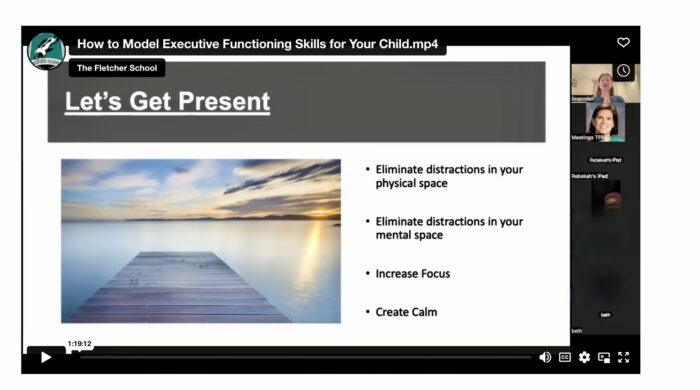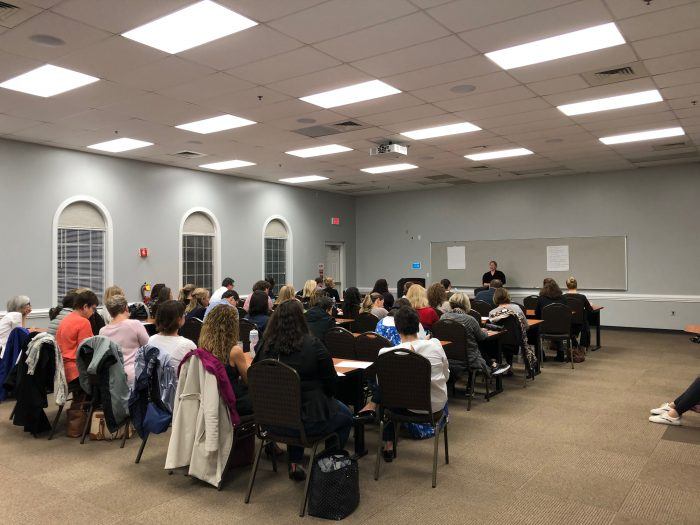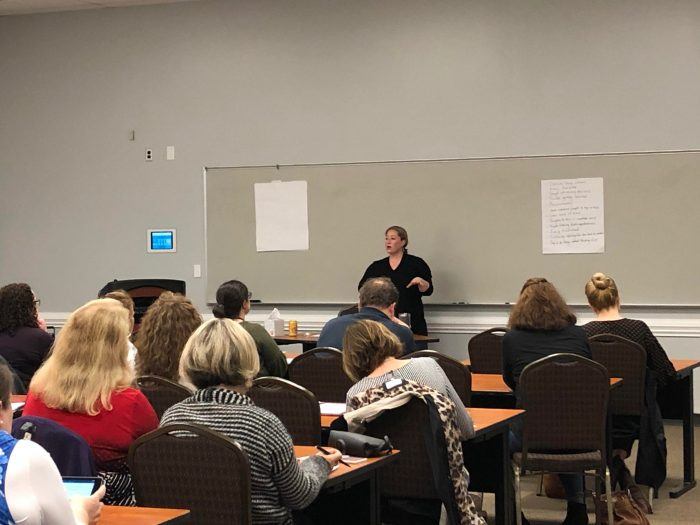News
Check out all the ways Better Sessions is educating the community and stay tuned for more articles, workshops, and presentations near you!
Lisa presents on Executive Functioning Skills and Healthy Behaviors at Salisbury Academy
By Lisa Podell | March 23, 2024 | Categories: Workshops
It was a pleasure speaking to this supportive community of educators and parents about identifying when your child needs additional support with executive functioning skills and practical ways to improve at home and in the classroom.

Lisa Podell Presents at The Rankin Insitute
By Lisa Podell | February 14, 2023 | Categories: Workshops
It is an honor to speak at The Rankin Institute each and every year. The theme remains the same: Ways parents can model executive functioning skills for their children. However, each year I update and refine the details based on what I’ve learned as an educator and a parent. This year I added a new segment on how to get present before jumping into a task that requires focus, patience, and attention, like this 90-minute talk I was giving to 50+ participants.
The next time you or your child are transitioning from one task to the next and it’s important to bring your full attention, consider the following:
- How can I eliminate distractions in my physical space? (silence your phone, close your laptop, and distance yourself from other people’s conversations)
- How can I eliminate distractions in my mental space? (write down the ideas or stressors that are cluttering up your mind)
- Increase focus (3 deep breathes, jumping jacks, push-ups, something that gets you out of your head and into your body: increase that heart rate!)
- Create calm (3 deep breathes, 1-2 stretches or yoga poses, listen to relaxing music)

How to Embrace your ADHD Strengths in Adulthood
By Jessica Swiger | November 18, 2020 | Categories: Resources
Each of our brains contains unimaginable strength and complexity. There are as many connections in a single cubic centimeter of brain tissue as there are stars in the Milky Way galaxy. It’s no surprise that adapting to how our specific brain works is a process that requires time, trial and error, and constant lifestyle adjustments.
For those adults living with ADHD this process can be frustrating, and it can be easy to focus on what is going wrong while losing sight of the strengths and neurodiverse gifts it can bring.
Here’s how to embrace your strengths to minimize challenges and set yourself up for success!
Identify your Strengths
Think about what activities fill you with the most energy and motivation. This will provide you with some insight. If this proves difficult, ask the people closest to you what they observe to be your strengths. In addition, practice reframing perceived negative traits into positive qualities.
Impulsive → Creative
Hyperactive → Full of energy
Forgetful → Present-minded
Easily distracted → Rich, stimulating inner world
Put Strengths into Practice
Once you have identified your personal strengths you can then use them to minimize challenges that may come up in work tasks and projects, family scheduling and planning, or completing college courses.
For adults that get easily distracted, use your creativity to release your thoughts so you can regain focus.
Task switching, or transitioning from one task to another, is more common than ever with smartphones, streaming, and internet rabbit holes. Start becoming conscious of when you are switching tasks and make a written note to come back to the original task. Be patient and gentle with yourself as you get used to this process.
-Use a distraction log or bullet journal to take advantage of your active mind and get your creative ideas down onto paper to give yourself the chance to implement them.
For adults that have trouble getting started, use your problem-solving skills to plan ahead and prioritize each task.
Because of the desire to seek novelty in every moment, day to day tasks may seem more tedious and mundane. Accept this unique quality, use your strong persistence to problem solve, and plan ahead by prioritizing each task- starting with the most important.
-Set up a pre-work routine and create a list of rewards to choose from after completing each unmotivating task. This can help you stick to your plan.
For adults that struggle to meet deadlines, use your ability to hyperfocus to get ahead on tasks.
Hyperfocus, or the ability to zero in and focus 100% on something for an extended period of time, can be harnessed as a powerful tool for productivity. When in a hyper-focused state, recognize the opportunity and try to get as much done as possible to get ahead for times when you are not as motivated.
–Set a timer and predetermine a milestone to achieve by the end of each work session. Plan for what you will transition to and why it’s important in order to maintain a well-balanced life.
Once we accept that there is more right with us than wrong with us we can start recognizing challenges as opportunities to use our strengths and begin living our lives with confidence and authenticity.
School-Ready Mindset
By Chad Beveridge | August 19, 2020 | Categories: Resources
A three-step guide on preparing your child’s mind for the new school year.

Shutterstock
Good Habits for the New School Year
By Lisa Podell | August 6, 2020 | Categories: Interviews, Press
Integrate the skills required to be successful at school, such as time management and planning, into your child’s home routine so that they are exercising these muscles on a daily basis.
Better Sessions Featured in Charlotte Parent Magazine
By Lisa Podell | August 2, 2020 | Categories: Press
Strategies for a strong start to the school year.
Healthy Ways to Lose Track of Time
By Lisa Podell | July 17, 2020 | Categories: Resources

Shutterstock
Keep Your Child’s Brain Active Over Summer Break
By Jessica Swiger | June 20, 2020 | Categories: Resources

Shutterstock
Three Essential Tools for Homeschooling During COVID-19
By Jessica Swiger | April 22, 2020 | Categories: Resources
With countless homeschooling resources and articles circulating online, you may be feeling overwhelmed and pressured to cultivate the “perfect” learning environment for your child.
Before we get into strategies, let’s take a moment to acknowledge how wonderful of a job you are doing. You did not sign up for this scenario, but here you are not only getting it done but also doing research and seeking techniques to improve, and that is something to admire.
Here are three common roadblocks as well as three simple and essential tools to help you manage this temporary journey through homeschooling.
Road Block #1: My child is disorganized and procrastinating on assignments.
Tool Needed: A Planning System
Whether it be daily, weekly, or monthly having a consistent system will allow your child to mentally and physically organize their obligations and manage their time.
Bullet Journal: a method for an all-in-one planner, with freedom for personalization.
Weekly Planner: to be filled out in the beginning of the week and adjusted as tasks and events come up.
Tip: Have your child pick one consistent location for the planner (Google calendars, notepad in phone, physical journal).
Road Block #2: My child is struggling with downtime and is complaining of boredom.
Tool Needed: A Flexible Routine
If we know what to expect, we feel safe and able to adapt to chaotic situations. Routines can be loose or strict depending on your family dynamics during this unique time.
Block Scheduling: focused blocks of time pieced together to create an ideal balance of work time and free time. This is a great editable template to try.
Loop Scheduling: geared towards homeschool setting, allows for flexibility among tasks and freedom of choice in activity or subject.
Task Cards: used to create a visual schedule; boosts a child’s independence and allows them to plan and prioritize.
Tip: If something about your current routine is not working then try a different resource, flexibility is key.
Road Block #3: My child lacks the motivation to sit down and do school work.
Tool Needed: Positive Reinforcement
Children who are struggling to stay motivated may respond well to incentives.
Incentive Tracker: motivates children by rewarding them for completing actions that align with their goals.
Ways to Encourage: give specific praise for your child’s actions and efforts rather than their grades or ability.
Tip: If your child is feeling stuck, encourage them to take a short, 10-15 minute “brain break” to stretch, eat a snack, or call a friend to reset.
These three quintessential tools will set a foundation of skills that will carry over into the rest of your child’s life and will prepare them for any roadblock that comes their way because this too shall pass!
Better Sessions at The Rankin Institute
By Lisa Podell | January 23, 2020 | Categories: Workshops
Lisa Podell, owner of Better Sessions spoke to 60+ parents and educators on the topic of How to Model Executive Functioning Skills for your Child. Over the course of the evening, parents learned how to expand their toolkit with new ways to successfully communicate with their child, integrate executive functioning skills into their daily tasks and create customized goals to experience immediate, positive changes.

Parents and Teachers Participate in Better Sessions Workshop at The Rankin Institute.

Lisa Podell, Owner of Better Sessions
